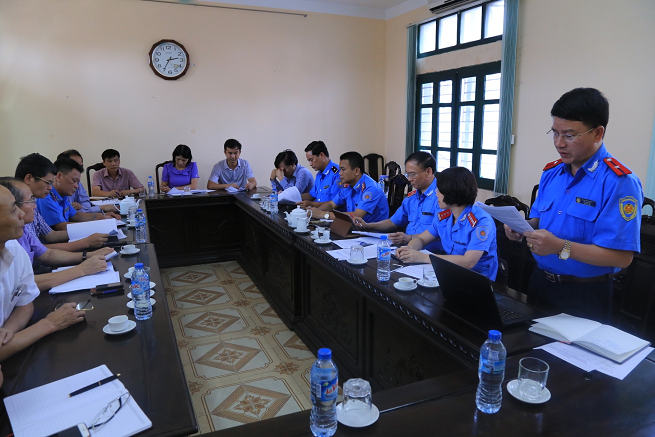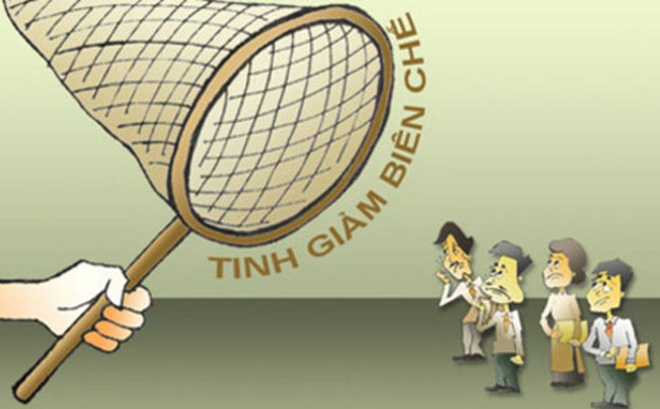Only one more week until officials across the country transition to an important timeframe with a series of new policies directly affecting their rights and interests. Specifically, from July 1, 2020, the following 12 new policies will simultaneously come into effect.
12 new policies impacting all officials from July 1, 2020 - Illustrative image
1. Basic salary of officials remains at 1.49 million VND/month
According to the content of Resolution 86/2019/QH14 ratified by the XIV National Assembly, 8th session on November 12, 2019, the National Assembly assigned the Government of Vietnam to adjust the increase of the statutory pay rate from 1.49 million VND/month to 1.6 million VND/month and adjust pensions, social insurance allowances, monthly allowances according to regulations (for subjects guaranteed by the State Budget) and preferential allowances for people with revolutionary contributions equal to the statutory pay rate from July 1, 2020.
However, due to the impact of the Covid-19 pandemic, in the afternoon of June 19, 2020, at the closing session, the National Assembly voted to pass the resolution of the 9th session, deciding not to adjust the statutory pay rate for officials and public employees, armed forces, and pensions from July 1, 2020. The statutory pay rate from July 1, 2020, applied to officials and armed forces (military, police, cipher) remains at 1,490,000 VND/month. With the maintenance of this statutory pay rate, salaries and allowances of officials from July 1, 2020, will be calculated as currently.
2. Official policies in public service providers officially abolished
Specifically, compared to the current regulations in the 2008 Law on Officials, the amended 2019 Law on officials and Law on Public Employees has removed those in the leadership apparatus and management of public service providers of the Communist Party of Vietnam, the State, political-social organizations from the definition of officials.
From July 1, 2020, the date this Law takes effect, there will no longer be official policies in public service providers as currently.
3. Additional form of official grade promotion
According to Clause 8, Article 1 of the 2019 amended Law on Officials and Public Employees, amending and supplementing Article 44 of the 2008 Law on Officials, promotion of official ranks must be based on job position, suitable with the structure of official ranks in the agency, organization, or unit and carried out through the forms of examination or appraisal.
Thus, the amended Law has added the form of appraisal for rank promotion alongside the examination form compared to the current regulations in the 2008 Law on Officials.
4. Officials may still be disciplined after resignation or retirement
Specifically, according to Clause 18, Article 1 of the 2019 amended Law on Officials and Public Employees, amending and supplementing Article 84 of the 2008 Law on Officials, any violations during the working period of officials who have resigned or retired will be dealt with according to the law. Depending on the nature and severity of the violation, the perpetrator may be subject to criminal, administrative, or disciplinary action. Officials who are found to have committed violations during their working period after resignation or retirement will be subject to one of the disciplinary forms, including reprimand, warning, or revocation of office status along with corresponding legal consequences.
Thus, from July 1, 2020, officials, although retired, will still be subject to disciplinary action for any prior violations in one of the three forms mentioned above.
5. No limitation period for disciplining officials in certain cases
According to Clause 1, Article 80 of the 2008 Law on Officials, the period for disciplinary action against officials is defined as 24 months from the time of violation, but the amended 2019 Law on Officials and Public Employees extends this to a maximum of 60 months from the time of violation.
Additionally, the law stipulates there will be no limitation period for disciplining officials for the following violations:
- Officials who are party members with violations severe enough for expulsion;
- Violations related to internal political protection tasks;
- Violations harming national interests in defense, security, or foreign relations;
- Using fake or illegal diplomas, certificates, or documentation.
Thus, officials will not have a limitation period for disciplinary actions and may be disciplined at any time upon discovery of any violations mentioned above.
6. Additional policies for talented officials
Specifically, according to Clause 2, Article 1 of the 2019 amended Law on Officials and Public Employees, amending and supplementing Article 6 of the 2008 Law on Officials, the State has policies for detecting, attracting, nurturing, valuing, and suitably treating talented individuals. It will assign the Government of Vietnam to provide a framework for policies on valuing and treating talented individuals in public service.
Based on the Government of Vietnam’s regulations, the heads of official management agencies will stipulate the policies for using and treating talented individuals in public service within their managed agencies, organizations, or units; the Provincial People's Council will stipulate policies for valuing and treating talented individuals within the agencies, organizations, or units under the provincial management.
Thus, from July 1, 2020, there will be more specific policies and regulations on using and treating talented officials.
7. Two additional cases where officials are recruited without examination
Specifically, according to Clause 5, Article 1 of the 2019 amended Law on Officials and Public Employees, amending and supplementing Article 37 of the 2008 Law on Officials, from July 1, 2020, there will be two additional cases where officials are recruited through the form of appraisal, including individuals trained under scholarship policies, returning to work at the locality where they were sent from after graduation, and outstanding graduates and young talented scientists.
8. From July 1, 2020, officials must undergo entry quality assessment
The 2019 amended Law on Officials and Law on Public Employees stipulates that before the competent authority selects and recruits officials, they must perform an entry quality assessment. Specifically: “An entry quality assessment for officials is required, except for cases stipulated in Clauses 2 and 3, Article 37 of this Law. The assessment must follow a process ensuring openness, transparency, practicality, and effectiveness.”
Thus, in the future, the recruitment of officials will not only depend on the examination results or application documents but also on the candidates' soft skills and actual abilities.
Currently, Article 39 of the 2008 Law on Officials only stipulates the recruitment authority without any regulations on entry quality assessment for officials.
9. From July 1, 2020, officials will be evaluated through concrete tasks and products
Specifically, according to the 2019 amended Law on Officials and Law on Public Employees, in addition to the current evaluation contents, from July 1, 2020, the evaluation of officials' and public employees' performance results must be linked to job positions, demonstrated through specific tasks and products. This will make the quality assessment of officials and public employees clearer, more accurate, and fairer than the current regulations.
10. From July 1, 2020, disciplined officials can still be appointed
Specifically, according to Clause 17, Article 1 of the 2019 amended Law on Officials and Law on Public Employees, amending and supplementing Clauses 2 and 3, Article 82 of the 2008 Law on Officials, officials disciplined with reprimand, warning, or salary reduction will not be promoted or appointed to higher positions within 12 months from the effective date of the disciplinary decision.
If disciplined with demotion or dismissal, officials will not be promoted within 24 months from the effective date of the disciplinary decision.
It can be seen that the 2019 amended Law on Officials and Law on Public Employees divides disciplinary actions against officials into two degrees for consideration of reappointment. Accordingly, if disciplined with reprimand, warning, or salary reduction, officials are not appointed to higher positions within 12 months but can be reappointed or assigned to lower positions. If disciplined with demotion or dismissal, officials are not appointed within 24 months.
After the mentioned period, if officials have no more violations requiring disciplinary action, they continue to be promoted, planned, trained, and appointed according to the law.
The current regulation in the 2008 Law on Officials stipulates that officials disciplined from reprimand to dismissal are not reappointed in any capacity.
11. Evaluation results of officials will be made public from July 1, 2020
Specifically, according to Clause 12, Article 1 of the 2019 amended Law on Officials and Law on Public Employees, amending and supplementing Article 58 of the 2008 Law on Officials, based on evaluation results, officials are classified according to the following levels: Excellent completion of tasks; Good completion of tasks; Completion of tasks; Failure to complete tasks.
The classification results of officials will be filed in the official records, notified to the evaluated officials, and publicly announced in their working agencies, organizations, or units.
According to the current regulation in the 2008 Law on Officials, the evaluation classification results are filed in the official records and notified to the evaluated officials.
12. New official ranks to be regulated by the Government of Vietnam
Specifically, according to Clause 7, Article 1 of the 2019 amended Law on Officials, adding Point e after Point d, Clause 1, Article 42 of the 2008 Law on Officials, a new official rank will be added, regulated by the Government of Vietnam, alongside the Senior Specialist and equivalent, Principal Specialist and equivalent, Specialist and equivalent, Collaborator and equivalent, Employee ranks.
Nguyen Trinh
 Article table of contents
Article table of contents

![[InfoGraphic] 6 forms of discipline for officials and public employees under Decree 71/2016/ND-CP](https://cdn.lawnet.vn//uploads/NewsThumbnail/2016/07/12/1319291-01.png)




.Medium.png)
.Medium.png)
.Medium.png)
.Medium.png)
